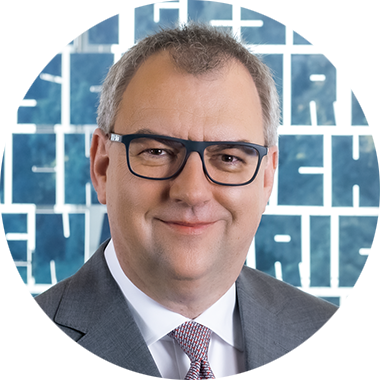Austria is brimming with ingenuity. Countless ideas are taking shape all the time – particularly at the country’s universities – ideas that mustn’t be allowed to languish in the realm of theory. And that’s a compelling argument for companies to leverage universities as incubators, especially when it comes to software solutions, a branch of digitalization that tends to attract a certain amount of derision in these parts. And yet software products have tremendous scalability, which could help boost our economic performance.
But good ideas need time to mature, so there’s no sense in rushing. The best example: It took Fast Research & Transfer twelve whole years to launch as a corporate spin-off of the Norwegian University of Science and Technology in Trondheim, and it has since expanded to become Europe’s most successful commercial specialist for information management and search technology. The fact that the company was bought out in 2008 by Microsoft for USD 1.2 billion is our continent’s bitter sequel to the success story.
If Europe hopes to match the pace of digital market success in the US and Asia, it will need more software-dominated companies, and that means more support and implementation for university-generated innovations. That is precisely the route that the proposed TU Linz aims to take – to establish itself as a technical university with a focus on digitalization and digital transformation. A strong connection to the leading research companies with a focus on robotics, artificial intelligence, and process digitalization is essential. By the time a constituent convention becomes active in the winter semester of 2021/22, experts from politics, academia, and industry will have worked to clarify the criteria for implementing this educational project. These include location, capacity, funding, curriculum planning, legal framework, and the university’s final name.
Deciding factors: Practicability and internationality
The objective is to position the digital university as a brand outside the country as well. But what is it that makes a university an educational magnet? According to a number of studies, a variety of criteria go into the choice of the best college or university: Are the professors who lecture there considered luminaries in their field? Which businesses are located in the region, which industries define the city, and where are the job opportunities? How does the university’s global network compare, and which partner universities does it cooperate with? What is the university’s level of innovation, and how actively and successfully does it promote spin-offs?
The quality of instruction and research as well as the attractiveness of the university’s home city carry particular weight in the selection process. According to a study by the Leipzig Graduate School of Management, however, the significance of these factors may shift during the decision-making process. While an emotional attachment to the university city scarcely loses importance in the deliberation phase, the academic qualities of the university can sometimes become less relevant. Instead, first-year students attach more importance to the staff-to-student ratio, or to whether the program of study is geared to the requirements of today’s working world; in other words, that it is practice-oriented and international.
Despite mounting competition, the European Union remains one of the largest host regions for international students. The renowned QS International Student Survey 2020 evaluated 29,500 responses from prospective students interested in studying in the EU. And here, too, we see the same pattern emerging: Potential students prefer universities with a high standard of instruction and outstanding career services, which means a solid connection to the business world.
TU Linz needs to generate European appeal
When it comes to collaboration between academia and industry, the situation within the Austrian higher education sector is getting better all the time. According to the University Report 2020, academic spin-offs, that is, the transition of a technological idea into an actual invention, increased from twelve spin-offs in 2017 to 19 in 2019 – invariably in the context of digitalization, because universities are “not only application fields for digital solutions, they themselves are drivers of digitalization in that they actively help to shape and advance the transition from analog to digital processes.” This involves leveraging academic knowledge for the benefit of society and the economy in various focal areas that are included in the so-called “third mission” of higher education institutions (the first two missions comprise teaching and research). The objective: “Successful collaboration between science and business grants access to leading-edge research expertise, it fosters synergies, and it plays a key role in siting decisions and in regional policy.”
And it’s exactly this access to business, this entrepreneurship, that will constitute one of the main pillars of Linz’s digital university. With its digital orientation, the new TU will have to develop a European presence with European appeal, making it a leading university that attracts students, researchers, and national and international investors. This includes recruiting internationally renowned professors, while English as the main working language should also be a matter of course. The new TU Linz will cooperate with other Austrian universities as well as universities abroad to ensure that the curriculum offered will be as heterogeneous as possible. The FH Upper Austria and the three existing technical universities in the country are the first points of contact.
One thing is clear: If a city intends to use its universities to attract the brightest minds, the whole package has to be spot on. As noted previously, urban quality of life is a crucial factor in this process, and a city’s transportation policies will either decisively elevate or downgrade this measure of quality. The fact that, as a university city, Graz is now planning the construction of a subway system is a positive sign. The current trend in Linz, however, is heading more in the direction of private transport, which is entirely at odds with forward-looking transport and traffic strategies. I earnestly hope that in the foreseeable future we will finally be able to herald the dawn of the 21st century in this regard. Once that happens, if not before, nothing more will stand in the way of making the TU Linz a European hotbed for digital entrepreneurship.




